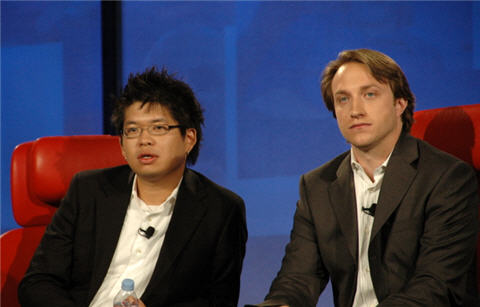D5: YouTubers and Viacom CEO weigh in on copyrights

Before coming on stage at the D conference, a cute video about the making of YouTube was shown, where co-founders Chad Hurley and Steve Chen are talking about coming up with a business idea while they are eating huge burritos, and how they wish their friends could watch them eat. From there they eat donuts, pull out a video camera and end up in the Google cafeteria, where the chef says, " Welcome to the cafe gentleman. We will give you anything you want."At this writing the video was not available on YouTube.
During the interview with Walt Mossberg, the YouTube co-founders and new Google employees were very composed and on point with their message--there are misconceptions about YouTube.
The best exchanges occurred on the subject of copyrights and the billion dollar lawsuit that Viacom brought against YouTube. "People say we are not developing tools or addressing issues with the site," Hurley said. He noted content management tools for applying metadata, such as tags, and limiting video length so that full-length movies don't get uploaded. Then he said that YouTube is doing a "really good job of educating users about copyright law." Chen added that YouTube is simplifying the copyright legalese and translating it into other languages.
Mossberg responded, "I am on YouTube two or three times a day and don't recall seeing any lectures on copyright law."
Hurley came back, "It's just one piece of the system we have in place. We are also adding layers of technology of top of what we are doing." He mentioned trials audio and video fingerprinting to identify copyright ownership. Then he said, "People have bought into misconceptions and don't understand what we are working on. We are still open to doing a deal [with Viacom] and showing what we have in place.
Mossberg asked if YouTube was a viable business without copyrighted material, such as what Viacom has--Colbert Report, Daily Show, South Park, MTV, Nickelodeon, etc. "Yes, more and more people are creating content and understand the tools. It's the early day, where digital photography was a few years ago," Hurley said. He views YouTube as "representing the video movement," and as a platform for powering other services.
YouTube will start offering content owners the option of placing "video-centric" advertising and revenue sharing of AdSense inventory in the next few months, Hurley said. "The preroll ads will be somewhere between five and ten seconds and highly target for video that follows the advertising," Chen said. "We don't want to interrupt the users' experience. We hope we are just adding value," Hurley chimed in.
In this context, Viacom CEO and President Phillipe Dauman gave his side of his company's suit against YouTube. He was preceded by an hilarious Stephen Colbert introduction, in which he called Dauman the "Dough Man." The Colbert video also showed the difference between typical YouTube user generated video and professional quality, super talent-based content.
Deadlines passed, the content wasn't filtered out of the site, so Viacom filed suit. If Google files suits to protect its search technology, then why shouldn't Viacom be able to protect its intellectual property, he reasoned. "Google is getting paid for search, we have to pay creators. It's a question of making it available to consumers and in a way that allows us to continue to create content." He argued that the DMCA wasn't intended to deal with big businesses that know about copyright laws, and that YouTube should be responsible for filtering out Viacom's 200,000 clips on the site.
"YouTube is in a position to look at what comes up. It's more efficient for them to screen content, but we have to look at everything. It's very expensive, costing us hundreds of thousands a month," Dauman said. He added that eventually he would love to be on YouTube but he has moved on, and that consumers will find great content wherever it lives on the Internet. He also believes that Google was under a reality distortion field when it acquired YouTube. "They think no one is going to challenge them because they are cool."
After the YouTube video, Gary Shapiro, president of the Consumer Electronics Association, asked about YouTube's role in changing the antiquated copyright laws. "We have a chance to make a difference and we will be looking for opportunities to do that. Right now the opportunity is under current law,"Hurley said.
YouTube may be leading the video movement, as Hurley said, but it is not leading a much-needed reformation of copyright law.
